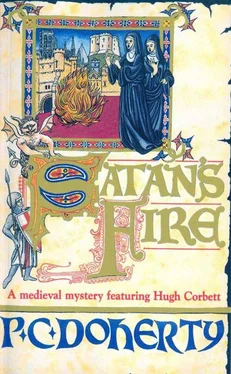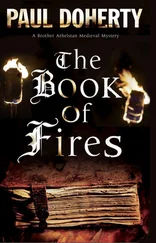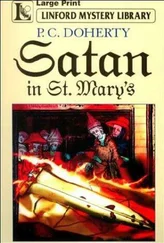Paul Doherty - Satan's Fire
Здесь есть возможность читать онлайн «Paul Doherty - Satan's Fire» весь текст электронной книги совершенно бесплатно (целиком полную версию без сокращений). В некоторых случаях можно слушать аудио, скачать через торрент в формате fb2 и присутствует краткое содержание. Год выпуска: 2012, ISBN: 2012, Издательство: Headline, Жанр: Исторический детектив, на английском языке. Описание произведения, (предисловие) а так же отзывы посетителей доступны на портале библиотеки ЛибКат.
- Название:Satan's Fire
- Автор:
- Издательство:Headline
- Жанр:
- Год:2012
- ISBN:9780755350360
- Рейтинг книги:3 / 5. Голосов: 1
-
Избранное:Добавить в избранное
- Отзывы:
-
Ваша оценка:
- 60
- 1
- 2
- 3
- 4
- 5
Satan's Fire: краткое содержание, описание и аннотация
Предлагаем к чтению аннотацию, описание, краткое содержание или предисловие (зависит от того, что написал сам автор книги «Satan's Fire»). Если вы не нашли необходимую информацию о книге — напишите в комментариях, мы постараемся отыскать её.
Satan's Fire — читать онлайн бесплатно полную книгу (весь текст) целиком
Ниже представлен текст книги, разбитый по страницам. Система сохранения места последней прочитанной страницы, позволяет с удобством читать онлайн бесплатно книгу «Satan's Fire», без необходимости каждый раз заново искать на чём Вы остановились. Поставьте закладку, и сможете в любой момент перейти на страницу, на которой закончили чтение.
Интервал:
Закладка:
‘And then what?’
‘Well, when I smelt the smoke and heard the screams, some of the servants and I went into the maze. It looks difficult to thread so you must keep moving in a certain direction.’ The old man’s face became sad. ‘But, by the time we reached the centre. .’ His voice faltered. ‘Oh, don’t misunderstand me. I have seen men burning alive at Acre but, in the centre of an English maze on a warm spring morning, to see a comrade’s body smouldering, blackened ash from head to toe. The flames must have been intense. The ground and the great iron candelabra were all burnt black. We sheeted the corpse and took it to the death-house. I went into the buttery. Perhaps I drank more than I should have. I felt sleepy so I went back to my cell. I was snoring my head off when Branquier woke me.’
‘What do you think caused the fire?’ Corbett asked.
‘I don’t know. The whispers say the fire of hell.’ The old librarian leaned closer. ‘But Sir Guido was a good man, kind and generous: a little addled in his wits but he loved God, Holy Mother Church and his Order. Why should such a good man be burnt, whilst the wicked swagger around boasting of their evil?’ The librarian blinked; he ran his good hand across the parchment, stroking it gently like a mother would a child.
‘I don’t believe it was the fire of hell,’ Corbett remarked. ‘Sir Guido was a good man. He was murdered. But how, and why, God only knows.’
‘The flames had died but it smelt so bad.’ Odo murmured. ‘I could smell the sulphur and brimstone in the air. Just like. .’
‘Like what?’ Corbett asked.
The old librarian scratched his unshaven cheek. ‘I can’t remember,’ he whispered. ‘God forgive me, Corbett, but I can’t.’ He looked at the clerk. ‘Is there anything else?’
Corbett shook his head and got to his feet. He gently pressed Odo’s thin shoulder.
‘They’ll talk of you in years to come,’ Corbett declared kindly. ‘They’ll talk of Odo Tharlestone, soldier and scholar. Your chronicle will be copied in monasteries, libraries and abbeys throughout the land. The halls of Oxford and Cambridge will bid for it.’
Odo looked up, his eyes sparkling. ‘Do you really think so?’
‘Oh, yes, the king has a great library at Westminster. He’ll want a copy as well but, Brother,’ Corbett added, ‘reflect on what you saw the morning Sir Guido died.’
And with the librarian’s assurance that he would do so ringing in his ears, Corbett went to the stables to join his companions.
A few minutes later, accompanied by Claverley and Ranulf, who were arguing noisily about which was the fairest, York or London, Corbett left Framlingham. They rode down the lonely pathway, past the guards and through the gate, turning left on to the Botham Bar road. The day was drawing on but the sun was still strong. The hedgerows on either side were alive with the rustling of birds and the buzzing of bees searching for honey amongst the wild flowers.
‘I have beehives,’ Claverley announced. ‘At least a dozen steppes in my garden. The best honey in York, Sir Hugh.’
Corbett smiled absentmindedly. His mind was back in that library. Odo had remembered something. Corbett just hoped the old man’s long memory would produce a key to unlock all these mysteries. They rode on under the shadow of the towering trees. At last Claverley reined in.
‘We have to leave the road here.’ The under-sheriff pointed to a small, beaten trackway on the edge of the forest. ‘The remains were found deeper in.’
‘What happened to them?’ Ranulf asked.
‘They had been unearthed by some animal. They were rotting, rather mangled, then tossed about by the hunting dogs. They were put into a leather sack; a verderer took them into the city for burial in a pauper’s grave. Look, I’ll show you.’
They left the trackway and entered the forest. The sunlight began to fade as the path wound along between holm, oak, elm, larch, black poplar, sycamore, beech and copper beech. The sky became shut off, the sunlight blocked out by the thick canopy of leaves and entwining branches. Their horses became uneasy at the rustling amongst the bracken and the sudden, startling song of some bird. Now and again there would be a break in the trees, and they’d cross a clearing where the grass grew long and lush and wild flowers filled the air with their heady scent. Then back into the green darkness, as if entering some strange cathedral where the walls were wooded, the roof green and the distant bird-song the chanting of some choir. Ranulf, frightened of nothing, stopped his banter with Claverley and peered nervously about. Corbett rode ahead, guiding his horse carefully, ears straining for the snap of the twig or a footfall which could mean danger. Now and again his horse would toss its head, snorting angrily. Corbett tightened his reins, stroking his horse’s neck, talking to it gently.
‘Of course, I’ve already been here,’ Claverley declared in a voice which seemed to boom amongst the trees. ‘It’s not far now.’
He pushed his horse forward and they entered a small glade. Claverley pointed to an outcrop of rock in the centre where the soil had been dug up and piled on either side of a hole. Corbett nudged his horse forward and carefully examined where the grisly remains of that mysterious victim had been buried. He stared at the rough cross carved on the rock.
‘Is there any settlement round here? A village or hamlet?’
Claverley shrugged and scratched his cropped hair. ‘Not that I know of.’
‘Well, there’s nothing behind us.’ Corbett remarked. ‘And there’s no trace of any settlement to the left or right, so let’s keep to the path we are following.’
They rode deeper into the forest. Corbett closed his eyes and prayed that the assassin from Framlingham had not followed them; he reined in, his horse whinnying at the acrid tang of the woodsmoke.
‘There’s something ahead,’ he called back.
‘Possibly a verderer,’ Claverley replied. ‘Or a woodcutter.’
At last the trees thinned and they rode into a clearing. At the far end, just in front of the line of trees, was a large, thatched cottage, its roof heavy and sloping. On either side of it were wooden sheds or byres and stacks of logs, around which scrawny-necked chickens pecked at the earth. A gaggle of geese, alarmed at their approach, turned from their feeding and fled screeching towards the house. The door opened and a mongrel dog came yapping at them, followed by two children dressed in ragged tunics, their hands and faces covered in soot, their thick hair greasy and matted. They showed no fear but stared up at these unexpected visitors, chattering in a dialect Corbett couldn’t understand.
‘What do you want?’
A man stood in the doorway. He was dressed in a dark-brown tunic, a piece of rope around his protuberant belly, leggings of the same colour pushed into black, battered boots. Over his shoulder a woman peered nervously at Corbett and his companions. The clerk raised his hand in peace. The man put down the axe he carried, called off the dog and walked towards them.
‘Are you lost?’ he asked.
‘No. We are from the city.’ Claverley edged his horse forward. ‘We are investigating the remains found in the clearing.’
The man glanced away. ‘Aye, I heard about the excitement,’ he muttered. He shuffled his feet nervously and turned to shout something at the children.
‘Can we come in?’ Corbett asked. He pointed across at the well. ‘Perhaps a stoup of water and something to eat? We are hungry.’
‘Master,’ Maltote spoke up, ‘we have just — ’ He shut up as Ranulf glared at him.
Corbett dismounted and held his hand out. ‘I am Sir Hugh Corbett, King’s Clerk — and you?’
Читать дальшеИнтервал:
Закладка:
Похожие книги на «Satan's Fire»
Представляем Вашему вниманию похожие книги на «Satan's Fire» списком для выбора. Мы отобрали схожую по названию и смыслу литературу в надежде предоставить читателям больше вариантов отыскать новые, интересные, ещё непрочитанные произведения.
Обсуждение, отзывы о книге «Satan's Fire» и просто собственные мнения читателей. Оставьте ваши комментарии, напишите, что Вы думаете о произведении, его смысле или главных героях. Укажите что конкретно понравилось, а что нет, и почему Вы так считаете.












